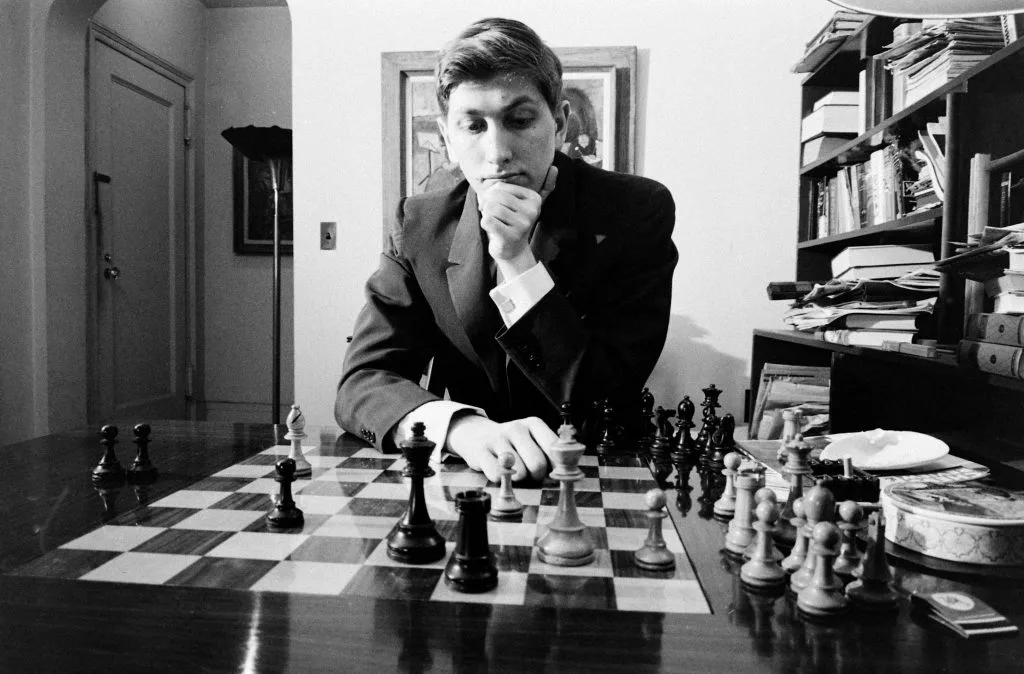Chess enthusiasts around the world know the name Bobby Fischer. His meteoric rise to fame, his brilliant gameplay, and his eventual withdrawal from the chess world have fascinated people for decades. If you’ve ever wondered about the circumstances that led to one of history’s greatest chess prodigies walking away from the game, you’re not alone.
Bobby Fischer quit chess due to a combination of political pressure, deteriorating mental health, paranoia, and disillusionment with the chess establishment. His departure came after winning the 1972 World Championship against Boris Spassky, when mounting pressures and his increasingly erratic behavior led him to forfeit his title in 1975 and withdraw from professional chess entirely.

In this article, we’ll explore the complex factors that contributed to Fischer’s decision to abandon the chess world, examine his troubled relationship with fame, and look at the lasting impact his departure had on the game he once dominated.
The Dramatic Exit of a Chess Genius
Bobby Fischer’s exit from chess wasn’t a simple decision but rather the culmination of a complex series of events and personal struggles. After becoming World Chess Champion in 1972 by defeating Boris Spassky in what was dubbed “The Match of the Century,” Fischer was at the pinnacle of his career. Yet, just three years later, he refused to defend his title against Anatoly Karpov and effectively disappeared from professional chess.
Fischer’s withdrawal shocked the chess community for several reasons. First, he was at the height of his powers, having achieved the highest rating gap between himself and other players in history. Second, his innovative approaches to openings and middlegame strategies were revolutionizing chess theory. Third, his celebrity status had brought unprecedented attention to chess globally.
The exact reasons for Fischer’s departure can be broken down into several key factors:
| Factor | Description |
|---|---|
| Political Pressure | The Cold War context made his matches political events beyond his control |
| Mental Health | Growing signs of paranoia and possibly undiagnosed conditions |
| Chess Politics | Disputes with FIDE over match conditions and formats |
| Personal Beliefs | Increasing obsession with conspiracy theories and anti-establishment views |
Perhaps the most telling evidence of Fischer’s mindset comes from his own demands before the 1975 championship match. He submitted a list of 179 conditions to FIDE (the World Chess Federation), many considered unreasonable. When FIDE refused to accept all his terms, Fischer refused to play—effectively abandoning his title without a fight.
The Cold War Chess Pawn
Bobby Fischer’s career unfolded against the backdrop of the Cold War, where chess was far more than just a game. The Soviet Union dominated chess for decades, using chess supremacy as evidence of intellectual superiority. When Fischer emerged as America’s chess prodigy, he unwittingly became a symbol in this ideological battle.
The 1972 World Championship match against Boris Spassky in Reykjavik, Iceland was framed as a Cold War confrontation. Henry Kissinger even called Fischer to encourage him to play for America’s honor. The pressure was immense—Fischer wasn’t just playing for himself but was positioned as the representative of Western intellectual capability against the Soviet chess machine.
This political dimension added tremendous pressure to Fischer’s already intense personality. After winning, he found himself caught in a spotlight he hadn’t anticipated and didn’t welcome. He became increasingly paranoid about Soviet players colluding against him and began to see chess organizations as extensions of political powers.
Fischer’s statements in rare interviews after his withdrawal suggest he felt manipulated as a political pawn. According to Fischer biographer Frank Brady, “Bobby began to feel that his achievements were being used for purposes beyond chess, and he resented becoming a Cold War symbol.” This resentment contributed significantly to his disillusionment with professional chess.
The burden of representing America in this “intellectual Cold War” created expectations and scrutiny that the already eccentric Fischer struggled to handle, pushing him further toward isolation and eventual withdrawal.
The Unraveling Mind

Fischer’s mental health appears to have played a crucial role in his departure from chess. While no formal diagnosis was ever confirmed during his competitive career, experts who have studied his behavior patterns note signs consistent with several psychological conditions, including paranoid personality disorder and possibly schizophrenia.
Another notable thing about fischer is his remarkable Intelligence and playing style. His chess games are so dynamic and aggressive
As Fischer’s fame grew, so did his eccentric behaviors. He became increasingly isolated, suspicious of others, and fixated on perceived slights. His demands before tournaments became more elaborate and often unreasonable. For the 1972 championship match alone, his complaints ranged from the lighting and noise levels to camera placement and audience distance.
Chess may have exacerbated Fischer’s mental health challenges in several ways:
- The intense concentration required for high-level chess
- The isolation of constant study and preparation
- The psychological warfare aspect of competitive chess
- The scrutiny and expectations that came with his celebrity status
Dr. Joseph G. Ponterotto, who conducted a psychological profile of Fischer, noted: “The very traits that made Fischer a chess genius—his absolute focus, pattern recognition abilities, and obsessive attention to detail—may have predisposed him to mental health challenges when applied to the social world.”
After withdrawing from chess, Fischer’s behavior became increasingly erratic. He lived in relative seclusion, occasionally emerging to make antisemitic and anti-American statements that shocked former supporters. These outbursts further suggest that untreated mental health issues played a significant role in both his departure from chess and his subsequent behavior.
Battles Beyond the Board
Bobby Fischer’s conflicts weren’t limited to the 64 squares of a chessboard. His increasingly contentious relationship with chess organizations, particularly FIDE, contributed significantly to his decision to walk away from professional chess.
Fischer had long been critical of what he perceived as favoritism toward Soviet players in tournament regulations. After becoming World Champion, he sought to reform what he saw as unfair competition formats. His most significant demand was changing the championship match format from a 24-game series to an unlimited match where the winner would be the first player to win 10 games, draws not counting.
When FIDE rejected Fischer’s demands for the 1975 championship defense against Anatoly Karpov, Fischer refused to compromise. On April 3, 1975, FIDE President Max Euwe had no choice but to award the title to Karpov by default. Fischer never again participated in a sanctioned chess tournament.
Fischer’s battles with chess authorities included:
- Disputes over prize money distribution and player compensation
- Arguments about tournament conditions and rules
- Accusations of Soviet collusion in tournaments
- Demands for more control over broadcasting rights
In a rare 1977 interview, Fischer claimed: “I didn’t resign the title, I was robbed of it.” This perspective highlights how Fischer viewed the chess establishment as corrupt and working against his interests, further fueling his disillusionment with professional chess.
His withdrawal represented not just a personal choice but a statement against what he viewed as a flawed chess system—a battle he ultimately chose to abandon rather than continue fighting within the constraints of organized chess.
Life After Chess
Following his withdrawal from competitive chess, Fischer essentially disappeared from public view for nearly 20 years. His life took a nomadic turn as he lived in various locations including California, Hungary, the Philippines, and eventually Iceland, where he was granted citizenship after facing legal troubles with the United States.
During this period, Fischer’s relationship with chess became increasingly complicated. Despite not competing professionally, evidence suggests he never entirely abandoned the game. According to those who knew him in his later years, Fischer continued to study chess innovations and occasionally played casual games with close associates, though he refused to be recorded or publicly acknowledged.
In 1992, Fischer briefly returned to the spotlight when he played a rematch against Boris Spassky in Yugoslavia, violating U.S. sanctions against the country. This match, which Fischer won, resulted in a warrant for his arrest in the United States, effectively making him an exile from his home country.
Fischer’s post-chess life was characterized by:
- Increasingly extreme political and religious views
- Growing antisemitism (despite his own Jewish heritage)
- Paranoia about being monitored by governments
- Financial uncertainty despite his earlier success
Perhaps most tragically, the brilliant mind that had once revolutionized chess turned toward conspiracy theories and hate-filled rhetoric. His rare public statements focused more on perceived global conspiracies than on the game that had made him famous.
When Fischer died in 2008 in Iceland, the chess world mourned not just his passing but the decades of potential contributions lost when he walked away from professional chess at the height of his abilities.
Final Thoughts
Bobby Fischer’s departure from chess represents one of the most complex and tragic stories in sports history. His withdrawal wasn’t simply about leaving a game—it was the intersection of genius, mental health struggles, Cold War politics, and a fiercely independent personality colliding with the constraints of organized competition.
The question of why Bobby Fischer quit chess has no single answer. It was the result of mounting pressures, both external and internal, that eventually overwhelmed even his remarkable mental resilience. His story serves as a sobering reminder of how the very qualities that can produce extraordinary achievement—intensity, perfectionism, and uncompromising standards—can also lead to isolation and self-destruction when pushed to extremes.
Fischer’s legacy remains complicated. He revolutionized chess with his brilliant play and approach to preparation, yet his abandonment of the game and subsequent behavior tarnished his reputation. What remains undisputed is that chess lost one of its greatest talents far too soon, leaving fans and historians to forever wonder what might have been had the troubled genius found a way to reconcile his personal demons with the game he mastered like few others in history.
